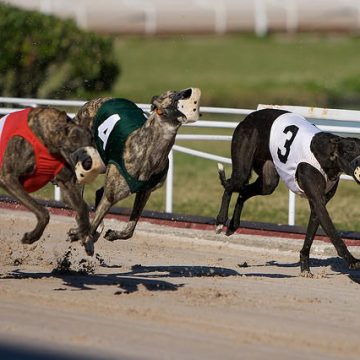
In a complete reversal from a decade ago, voters in the state of Florida will face a referendum regarding whether dog racing will be banned in the state. That vote is critical because it could have a seismic effect on the Florida poker industry, which was banned as recently as the mid-2000s and was thought of as an “add on” to the racing industry when it was approved in 2005.
After a decision by the Florida Constitution Revision Committee, the Sunshine State’s citizens will be faced with the question of whether dog racing will continue to be a licensed activity in the state. Currently there are 13 racing facilities in the state which feature a slate of races between greyhounds that have been bred for the act. But there have been many discussions regarding the treatment of the animals by their trainers and the usage of “performance enhancement” drugs.
Bestbet Orange Park, one of the locations for greyhound racing in the Jacksonville area, has seen a trainer that has had 18 dogs under his tutelage test positive for cocaine in their systems in 2017. There are also instances of dogs being over-raced because of the demands on the greyhound racing industry. Part of those demands are put upon the dog tracks because of their very popular poker rooms and the laws that have been written.
Under Florida law, a venue that offers poker on its premises also must feature a full racing schedule for greyhounds, a slate of events for horse racing or offer simulcasting (off-track betting, or OTB) on its premises. When the poker industry in Florida first started, it was nowhere near the behemoth that it is today. In fact, when poker was initially offered with horse and dog racing in the state, it was dog and horse racing that ruled.
Poker wasn’t being dealt during the heyday of the racetracks in the mid-2000s, when they were drawing in around $1.5 billion in revenues as of 2015. Since poker started being dealt at the tracks, there has been a 52% drop in revenues for dog and horse racing. For the Fiscal Year 2017, the racing industry only pulled in $717 million in revenues. Meanwhile, poker room revenues rocketed upwards – especially after the laws were loosened in 2007 regarding stakes and games that could be played – with over $156 million in earnings in Fiscal Year 2017.
Because the laws designate that there must be some sort of racing being held for the poker room to exist, what would be the ramifications on said poker rooms? In some instances, the tracks might be able to shift to a simulcast schedule – enabling the tracks to keep operating their lucrative poker rooms – but others might not be able to justify the expenditure of keeping the doors open. And the dog racing industry in Florida, which has flourished since the 1930s, would be decimated, with potential losses totaling into the billions.
In an interview with WBBH Fort Myers’ Chris Lovingood, a spokesperson for the Naples/Fort Myers Greyhound Track stated that the change, if passed by the voters, would “impact our business huge.” Isadore Havernick of the Naples/Fort Myers Greyhound Track also stated that “Dog racing has always been the cornerstone of our business, so we (would) have to reinvent ourselves and recreate ourselves.” While saying this, however, Havernick also indicated that poker was now the major moneymaker for the track, not the dog racing.
Another question for the voters in Florida will be the expansion of gambling in the state. Other than the dog tracks/poker rooms and the Seminole Indian tribe casinos, there is no other gambling allowed in the state. If voters pass this referendum, it would open the state for casino gaming outside of the Seminole Indian offerings. It would also set up a collision course between the state and the Seminoles, who currently have a monopoly on casino gaming in the state and donate approximately $250 million of their revenues to the state to maintain that monopoly.
The upcoming votes in Florida could reshape the poker and gaming industries in the state. If dog racing is ended, then the Florida state legislature would be hard pressed to find a way to replace that $700 million or so in revenues that the tracks bring in. They would also have to change the laws to allow those former dog tracks with poker rooms the ability to operate without having the greyhound racing available. Thus, the legislature is probably wanting, if the vote is to end dog racing, the vote to come out positive for the expansion of casino gaming in the state.















